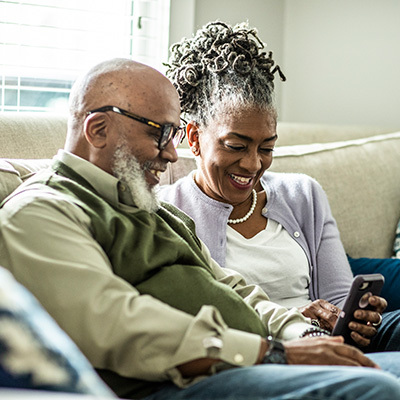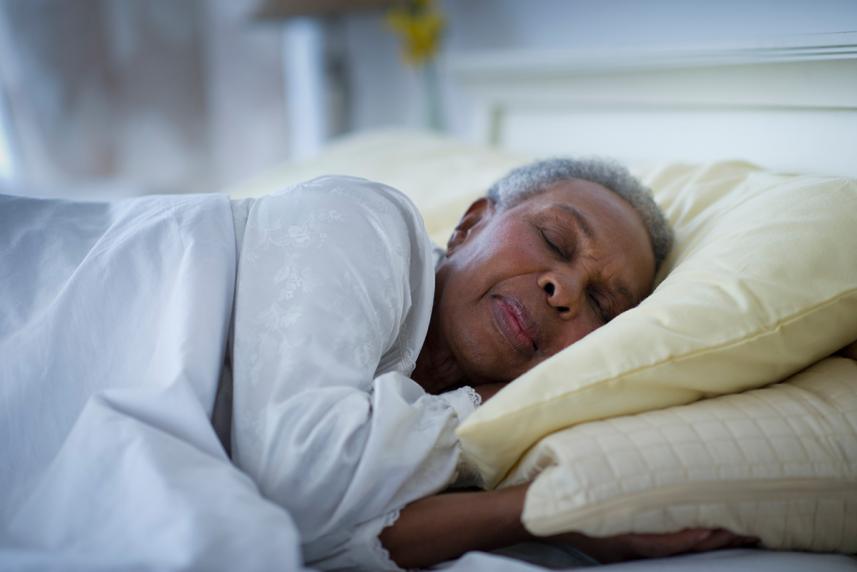
Find out if you qualify for an Aetna® Dual Eligible Special Needs Plan — we’re ready to help!
Your medications, pets and even your favorite dessert could be to blame for your sleepless nights. Here’s how to outsmart these hidden sleep stealers.

Contrary to popular belief, older adults don’t need less sleep than younger ones. We all need seven to nine hours per night.
Unfortunately, good-quality sleep seems to be harder to come by as we get older. Nearly half of older adults say they have trouble falling asleep or staying asleep. Both are forms of insomnia, and the risk of these sleep issues goes up after age 65.*
The fallout is more than just feeling tired the next day. Too little sleep has been linked with a greater risk of several health concerns, including:*

Find out if you qualify for an Aetna® Dual Eligible Special Needs Plan — we’re ready to help!
Chances are, if you've struggled with sleep issues, you've tried the usual tricks.
That might include things like setting up a quiet, dark, cool and comfy sleeping area. Maybe you’ve also tried avoiding coffee and caffeinated tea late in the day. Those are all good science-backed strategies. However, if they haven’t worked for you, there might be some other hidden culprits keeping you up at night.
Here are some of the lesser-known causes of poor sleep. Get to know them — as well as some expert-backed solutions for getting the z’s you need and overcoming obstacles to better health.
“We have much more blue light exposure than ever — from phones, TVs and computers,” says sleep scientist Stephanie Griggs, PhD. She’s an assistant professor at the Frances Payne Bolton School of Nursing at Case Western Reserve University in Cleveland.
The problem is that blue light “tricks the brain into thinking it’s daytime and it suppresses melatonin,” Griggs says. Melatonin is a hormone that helps bring on sleep.
Research has found that the more time people spend with media devices in the evening, the longer it takes for them to fall asleep. It also leads to worse sleep quality and feeling more tired in the morning.*
The solution is simple, says Griggs: Use night settings on your phone and computer to dim the blue light in the evening. Then set a digital curfew to stop using digital devices an hour or two before bedtime.
Coffee and tea aren’t the only sources of caffeine. Chocolate and many sodas contain it, too. And having any caffeine at dinnertime — a chocolatey dessert included — can disturb sleep.
Even a midafternoon caffeine fix could keep you up later. “Some people are very sensitive to caffeine,” Griggs says. “The effects of caffeine can last six to eight hours.” It blocks certain receptors in the brain, which can fool the brain into thinking it’s not time to sleep.
Griggs’s recommendation: If you’re sensitive to the effects of caffeine, steer clear of all caffeine sources after 1 PM. That will give it plenty of time to work its way out of your system so you can drift off to sleep more easily at night.
Some OTC medicines have the unwanted side effect of perking you up. Headache medicines like Excedrin, for example, contain caffeine. Just as with coffee or chocolate, it could get in the way of a good night’s sleep if you take it in the evening.
Other medicines can have an effect that’s the opposite of what you might expect. For example, antihistamines like Benadryl make most people sleepy — but they can pep others up. And taking B vitamins in the evening can have a stimulating effect on some people, Griggs says.
Your best bet is to read the labels of medicines and supplement packages to see if they may have a stimulating effect. “If you start noticing that a medicine is keeping you awake, ask your provider if you can take it in the morning or at a different time of day,” Griggs suggests.
Drinking alcohol is a double-edged sword as far as sleep goes. On one hand, it can make people drowsy and help them fall asleep faster. On the other hand, the effects of alcohol can cause problems with the quality of sleep. That can lead to more fragmented sleep, especially in the second half of the night, Griggs says.
To sidestep this effect, cut back on your alcohol consumption, especially as you get close to bedtime. Also be sure to stay well hydrated. That way, a dry mouth doesn’t wake you up during the night.
“We’re creatures of habit,” says Griggs. “Our brains are trained to be on a 24-hour cycle. Therefore, the more consistent our timing is for bedtime and awakening, the better it is for sleep.”
But when bedtimes and wake-up times change from day to day, it interferes with sleep efficiency. (Poor sleep efficiency means you spend more time in bed but less of that time actually asleep.) That leads to restless, poor-quality sleep.
The solution here is another simple one, Griggs says: Stick to the same bedtime (give or take an hour) and wake-up time every day. Yes, even on weekends.
While it isn’t true for everyone, some people find that doing vigorous exercise in the evening can upset the quality of their sleep. This may be partly because brisk exercise increases heart rate, body temperature and adrenaline levels, Griggs says. And higher levels of all three wake up your body. “We recommend lighter exercise, such as stretching, in the after-dinner hours,” says Griggs. In fact, research has found that doing a gentle yoga routine can improve sleep for women with sleep problems.*
It may be comforting to curl up with your pooch in bed. However, those snuggles could compromise your sleep quality. When people sleep with their dog, the dog’s movements while sleeping often influence their own movement. Research shows this could lead to sleep arousals and disturbances.*
“If your pet is affecting your sleep, have them sleep on the floor,” Griggs says. Or think about whether it’s time to banish Fido from the bedroom. We know it’s sad — but think about how happy he’ll be to see a well-rested you the next morning.
If you qualify for both Medicare and Medicaid, you may be eligible for an Aetna® Dual Eligible Special Needs Plan (D-SNP).
If you're 65 or older and have diabetes or an eligible heart disease, you may qualify for an Aetna® Chronic Condition Special Needs Plan (C-SNP). C-SNPs are currently available in select counties in IL and PA.
You may be eligible for an Institutional Special Needs Plan (I-SNP) if you’ve lived (or plan to live) in a participating facility for 90+ days or you have Medicare Part A (hospital insurance) and Part B (medical insurance).
*FOR SLEEP ISSUES OVER 65 YEARS OLD: Tatineny P. Sleep in the Elderly. Missouri Medicine. September-October 2020; 117(5): 490–495. Accessed September 6, 2024.
*FOR THE HEALTH IMPACTS OF POOR SLEEP: Clement-Carbonell V, Portilla-Tamarit I, et al. Sleep Quality, Mental and Physical Health: A Differential Relationship. International Journal of Environmental Research and Public Health, January 2021; 18(2): 460. Accessed September 6, 2024.
*FOR THE SCIENCE ON BLUE LIGHT AND SLEEP: Šmotek M, Fárková E, Manková D et al. Evening and night exposure to screens of media devices and its association with subjectively perceived sleep: should "light hygiene" be given more attention? Sleep Health. August 2020; 6(4): 498-505. Accessed September 6, 2024.
*FOR THE SLEEP BENEFITS OF YOGA: Wang W, Chen KH, Pan YC, et al. The effect of yoga on sleep quality and insomnia in women with sleep problems: a systemic review and meta-analysis. BMC Psychiatry. May 1, 2020; 20(195). Accessed September 6, 2024.
*FOR THE IMPACTS OF SLEEPING WITH PETS: Hoffman CL, Browne M and Smith BP. Human-animal co-sleeping: an actigraphy-based assessment of dogs’ impacts on women’s nighttime movements. Animals. February 2020; 10(2): 278. Accessed September 6, 2024.
Plan features and availability may vary by service area.
This material is for informational purposes only and is not medical advice. Health information programs provide general health information and are not a substitute for diagnosis or treatment by a physician or other health care professional. Contact a health care professional with any questions or concerns about specific health care needs.
Aetna Medicare is a HMO, PPO plan with a Medicare contract. Our DSNPs also have contracts with state Medicaid programs. Enrollment in our plans depends on contract renewal.
To send a complaint to Aetna, call the Plan or the number on your member ID card. To send a complaint to Medicare, call 1-800-MEDICARE (TTY users should call 1-877-486-2048), 24 hours a day/7 days a week. If your complaint involves a broker or agent, be sure to include the name of the person when filing your grievance.
The benefits mentioned are part of special supplemental program for the chronically ill. Eligibility is determined by whether you have a chronic condition associated with this benefit. Standards may vary for each benefit. Conditions include Hypertension, Hyperlipidemia, Diabetes, Cardiovascular Disorders, Cancer. Other eligible conditions may apply. Contact us to confirm your eligibility for these benefits. If you have questions, call us at 1-833-228-1297 (TTY: 711) 7 days a week, 8 AM to 8 PM.
Eligibility for the Model Benefit or Reward and Incentive (RI) Programs under the Value-Based Insurance Design (VBID) Model is not assured and will be determined by Aetna after enrollment, based on relevant criteria (e.g., clinical diagnoses, eligibility criteria, participation in a disease state management program).
Nondiscrimination Notice | CA-Specific Nondiscrimination Notice
©2025 Aetna Inc.
Y0001_3716003_2025_M
2942882-07-01
Call us at 1-833-228-1297 (TTY: 711) between 8 AM and 8 PM, Monday through Friday. Or visit AetnaMedicare.com/YourDSNP anytime.